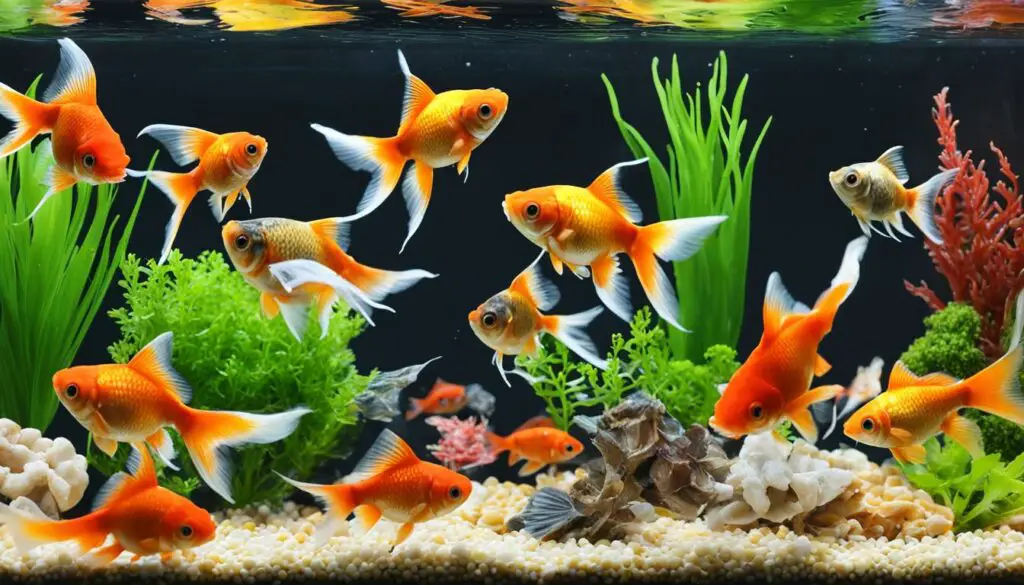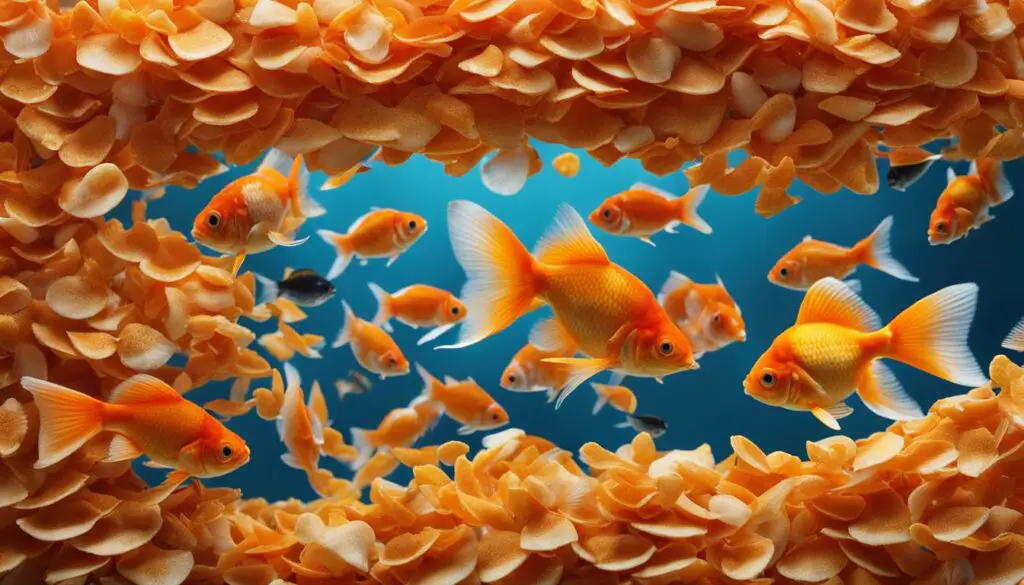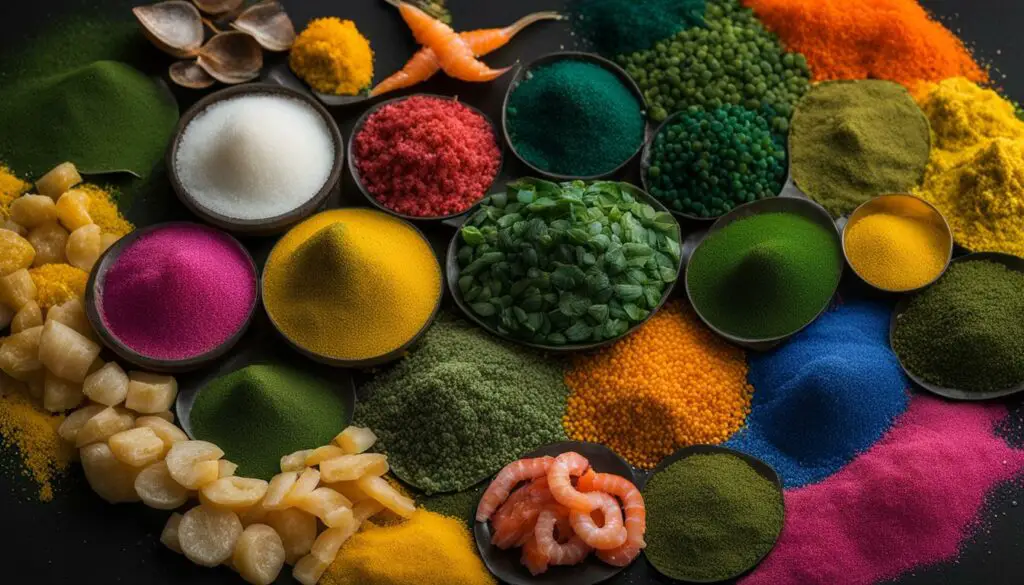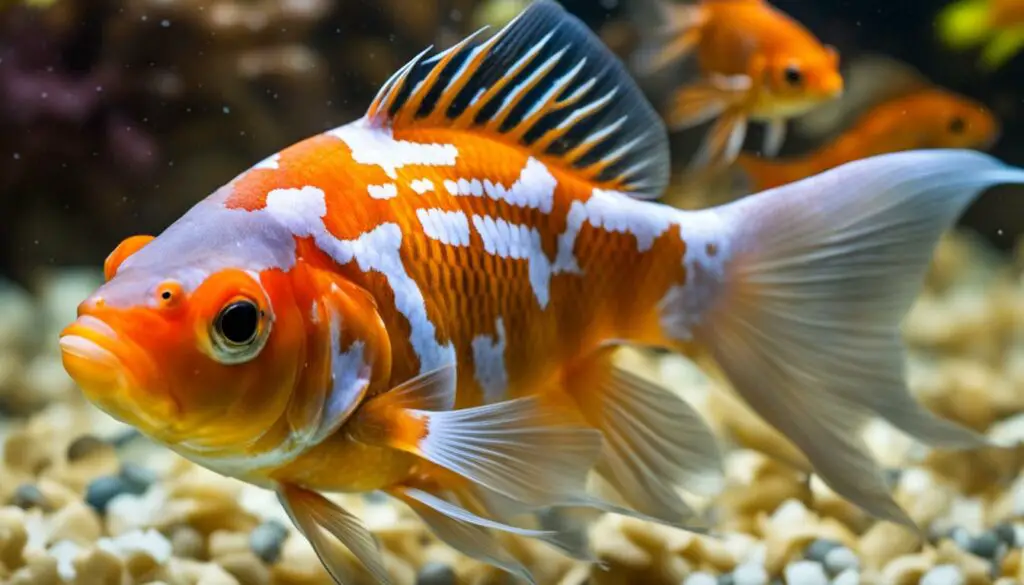Last Updated on 2 months by admin
Goldfish are known for their resilience and ability to adapt to a variety of environments, including different types of food. However, when it comes to feeding them tropical flakes, there are a few things to consider. While goldfish can eat tropical flakes, it is not the healthiest option for their long-term nutrition.
Goldfish have specific dietary requirements that differ from tropical fish. Their diet should include a moderate amount of protein and high fiber content, which helps to support their digestive system. On the other hand, tropical fish food is typically higher in protein and lower in fiber, which may not provide goldfish with the necessary nutrients for their overall health.
When considering the diet of your goldfish, it is important to prioritize their specific needs. Opting for goldfish-based food, such as flakes, gels, or pellets, ensures that they receive a balanced combination of protein and plant-based foods. These specially formulated foods are designed to meet the nutritional needs of goldfish, supporting their growth and overall well-being.
While it is possible to add tropical fish flakes to your goldfish’s diet as a protein boost, it should be done in moderation and not as a substitute for their regular food. Feeding a small amount of tropical flakes (up to 2 times a week) alongside their staple goldfish-based diet can provide additional protein and energy, but it should not replace their main source of nutrition.
Remember, variety is key when it comes to a goldfish’s diet. Incorporating high-quality goldfish food, algae-based foods, and occasional live or frozen foods into their feeding schedule ensures they receive the necessary nutrients for a healthy and enriched life.
By understanding the specific dietary requirements of goldfish and providing them with a well-rounded diet, you can help promote their overall health and longevity.
Key Takeaways:
- Goldfish can eat tropical flakes, but it is not the healthiest option for their long-term nutrition.
- Goldfish require a diet with a moderate amount of protein and high fiber content.
- Opt for goldfish-based food, such as flakes, gels, or pellets, to meet their specific nutritional needs.
- Adding tropical fish flakes to their diet can be done as a protein boost, but it should not replace their regular food.
- Variety is essential in a goldfish’s diet, including high-quality goldfish food, algae-based foods, and occasional live or frozen foods.
Goldfish Dietary Requirements

Goldfish, being naturally omnivorous, have specific dietary requirements for optimal health. To ensure their proper nutrition, it is essential to provide them with goldfish-based food that caters to their specific needs. Various options, such as flakes, gels, and pellets, are available in the market, formulated specifically for goldfish.
Goldfish-based food offers a balanced combination of protein and plant-based ingredients, meeting their dietary needs effectively. These foods are designed to provide the necessary nutrients, including protein and fiber, which are essential for the overall well-being of goldfish.
When it comes to feeding goldfish, using goldfish flake food is a popular choice among pet owners. These flakes are packed with the right nutrients and come in various flavors, offering a diverse feeding experience for your goldfish. Goldfish flake food is an excellent option to incorporate into their dietary routine, and it can be easily found in most pet stores.
In addition to flakes, goldfish gels and pellets are alternative options that provide the same balanced nutrition. Goldfish gels are water-based and offer a gelatinous texture that is both delicious and nutritious for your goldfish. Goldfish pellets, on the other hand, are compact and convenient, providing a concentrated source of essential nutrients.
It’s important to note that while goldfish have specific dietary requirements, their diet should also include variety. By incorporating different forms of goldfish-based food into their feeding routine, you ensure that they receive a wide range of nutrients necessary for their growth and overall health.
Goldfish Dietary Requirements
When it comes to goldfish dietary requirements, a well-balanced diet consists of:
- High-quality goldfish flakes
- Goldfish gels
- Goldfish pellets
- Occasional live or frozen foods (such as bloodworms or brine shrimp)
By providing a combination of these foods, you can meet the specific nutritional needs of your goldfish, ensuring they receive the essential proteins and fibers for their optimal health.
| Goldfish-Based Food Options | Features |
|---|---|
| Goldfish Flakes | Easy to feed; available in various flavors; provide balanced nutrition |
| Goldfish Gels | Water-based; gelatinous texture; nutritious and delicious |
| Goldfish Pellets | Compact and convenient; concentrated source of essential nutrients |
“By providing goldfish-based foods that cater to their specific dietary requirements, you ensure that your goldfish receive the right balance of protein and fiber for optimal health.”
Feeding your goldfish a well-rounded diet that includes goldfish flakes, gels, and pellets is essential to meet their dietary needs. The variety in their food helps prevent nutritional imbalances and supports their overall health and longevity. So, next time you go shopping for your goldfish’s food, choose goldfish-based options that offer the perfect combination of nutrition and taste.
The Difference Between Goldfish Food And Tropical Fish Flakes

When it comes to feeding your goldfish, it’s important to understand the difference between goldfish food and tropical fish flakes. While both options may seem similar, they have distinct characteristics that cater to the specific needs of different fish species.
Goldfish Flakes:
Goldfish flakes are specifically formulated to provide the necessary nutrition for goldfish. They typically contain a blend of algae, fish meal, vitamins, and minerals. These flakes are larger in size compared to tropical fish flakes, making it easier for goldfish to consume. Goldfish flakes have a lower protein content and a higher fiber content, which aligns with the dietary requirements of goldfish.
Tropical Fish Flakes:
Tropical fish flakes, on the other hand, are designed to meet the nutritional needs of tropical fish species such as tetras or guppies. They usually have a higher protein content and a lower fiber content, which suits the higher metabolic rate of tropical fish. These flakes are smaller in size, suitable for the small mouths of tropical fish.
| Goldfish Flakes | Tropical Fish Flakes | |
|---|---|---|
| Protein Content | Lower | Higher |
| Fiber Content | Higher | Lower |
| Size | Larger | Smaller |
It is important to choose the right type of food that meets the specific nutritional needs of your goldfish. While goldfish can consume tropical fish flakes, it may not provide them with the ideal balance of nutrients they require for optimal health. Goldfish flakes offer a combination of algae, fish meal, and essential nutrients, ensuring your goldfish receives a well-rounded diet.
Remember, a healthy diet plays a crucial role in the overall well-being of your goldfish, promoting their growth, vibrant colors, and robust immune system. So choose wisely and provide your goldfish with the nutrition they need to thrive.
Image: Goldfish flakes and tropical fish flakes (source: Shutterstock)
Tropical Fish Food Ingredients

Tropical fish food is formulated with a diverse range of ingredients to provide the essential nutrients these fish need for optimal health. It typically consists of a combination of protein-based ingredients, vegetative ingredients, preservatives, and colorants.
Protein is a vital component of tropical fish diet as it supports growth, development, and overall vitality. Many tropical fish food formulas include protein from sources such as fishmeal, shrimp, and krill. These protein-rich ingredients provide the necessary amino acids for healthy muscle development and immune function.
In addition to protein, tropical fish food often contains a variety of vegetative ingredients. These can include algae, spirulina, and plant-based extracts. These ingredients provide natural sources of essential vitamins, minerals, and antioxidants that support the overall well-being of tropical fish.
Preservatives are sometimes added to tropical fish food to extend its shelf life and ensure its freshness. Common preservatives used include ethoxyquin and mixed tocopherols. These ingredients help maintain the nutritional integrity of the food and prevent spoilage.
Colorants are another common ingredient in tropical fish food. These are typically natural or synthetic substances that enhance the visual appeal of the food. Colorants are used to replicate the vibrant hues found in the natural diet of tropical fish, making the food more visually enticing.
It’s important to note that the specific ingredients and their proportions can vary depending on the brand and formulation of the tropical fish food. It’s recommended to choose high-quality brands that prioritize the nutritional needs of tropical fish.
In summary, tropical fish food contains a diverse array of ingredients, including protein-based ingredients, vegetative ingredients, preservatives, and colorants. These ingredients work together to provide tropical fish with the essential nutrients they need for optimum health and vitality.
Health Effects From an Inadequate Diet

Feeding goldfish an inadequate diet can have detrimental health effects. It is crucial to provide them with a well-balanced diet to ensure their overall well-being. Here are some of the health issues that can arise from an inadequate diet:
- Slow Growth: Goldfish may experience stunted growth if they do not receive the necessary nutrients from their diet.
- Anorexia: An inadequate diet can lead to loss of appetite and refusal to eat, resulting in weight loss and weakened immune system.
- Fin Nipping from Tank Mates: In an overcrowded tank or when housed with aggressive tank mates, goldfish with an inadequate diet may experience fin nipping.
- Bottom Sitting: Goldfish may exhibit bottom sitting behavior, where they rest on the tank floor, if their diet lacks essential nutrients.
- Clamped Fins: Inadequate nutrition can cause goldfish to have clamped fins, where their fins are folded tightly against their body.
- Constipation: A poor diet lacking in fiber can lead to constipation in goldfish, causing discomfort and digestive issues.
- Color Loss: Goldfish may experience a loss of vibrant colors and develop a dull appearance if their diet is inadequate.
- Protruding Bones: Insufficient nutrition can cause goldfish to have protruding or visible bones, indicating malnutrition.
- Enlarged Eyes: Goldfish with an inadequate diet may develop swollen or enlarged eyes, a condition known as exophthalmia.
- Rapid Breathing: Goldfish may exhibit rapid breathing, struggling to get enough oxygen, if their diet is not providing the necessary energy.
It is important to observe your goldfish for these signs and take action to improve their diet if needed. Providing a nutritionally balanced and varied diet will help promote their health and longevity.
Adding Tropical Fish Flakes to Your Goldfish’s Diet
If you want to give your goldfish a protein boost, adding tropical fish flakes to their diet can be an option. However, it is important to use them in moderation and not as a substitute for goldfish flakes. Feeding your goldfish a small amount of tropical fish flakes (up to 2 times a week) alongside their staple goldfish-based diet can provide them with additional protein and energy.
It’s crucial to remember that goldfish have specific dietary needs, and relying solely on tropical fish flakes may not meet all these requirements. While the protein boost from the flakes can be beneficial, a well-rounded diet that prioritizes goldfish flakes is essential for their overall health and well-being.
“Adding a small amount of tropical fish flakes to a goldfish’s diet can provide an extra protein boost, but it should never replace their staple goldfish flakes. Variety is key in their diet to ensure they receive all the necessary nutrients.”
Feeding your goldfish a diverse selection of food will contribute to their overall health and nutrition. Alongside the tropical fish flakes, consider incorporating other foods that are suitable for goldfish. This could include algae-based foods, live or frozen foods, and even homemade gel or pellet formulas.
Feeding Frequency
When introducing tropical fish flakes to your goldfish’s diet, it’s important to consider the feeding frequency. As a general guideline, feeding them tropical fish flakes up to 2 times a week, in combination with their regular goldfish flakes, is sufficient. This frequency allows for the protein boost without compromising their nutritional balance.
Choosing a Substitute for Goldfish Flakes
If you are looking for a substitute for goldfish flakes, it is best to opt for high-quality goldfish-based foods that are specially formulated to meet their dietary requirements. These foods are designed to provide the right balance of protein and fiber that goldfish need for optimal growth and health.
Here is a comparison table of goldfish flakes and tropical fish flakes to help you understand the differences:
| Goldfish Flakes | Tropical Fish Flakes |
|---|---|
| Contain moderate protein and high fiber content | Higher protein and lower fiber content |
| Larger in size, suitable for goldfish to consume | Smaller in size, designed for tropical fish |
| Specifically formulated for goldfish’s nutritional needs | Designed for the dietary requirements of tropical fish |
Remember, choosing the right type of food for your goldfish is crucial for their overall health and well-being. Prioritizing their specific dietary needs and providing a balanced and varied diet will ensure they receive the necessary nutrients for a healthy and happy life.
Conclusion
Proper nutrition plays a crucial role in the overall health and well-being of goldfish. While they can eat tropical fish flakes, a more balanced and vegetable-based diet is recommended for their long-term nutritional needs. A varied diet that includes high-quality goldfish food, algae-based foods, and occasional live or frozen foods ensures that goldfish receive the necessary nutrients for optimal health.
Goldfish require a variety of foods to thrive, and a vegetable-based diet should be prioritized over a purely meat-based diet. Including a range of nutritious options in their feeding schedule helps to provide the essential vitamins, minerals, and fiber that goldfish need.
To ensure the proper nutrition for your goldfish, consider incorporating a mix of high-quality goldfish food, such as flakes or pellets, along with vegetable-based options like algae or blanched vegetables. It’s also beneficial to occasionally supplement their diet with live or frozen foods to provide additional variety and stimulation.
FAQ
Can goldfish eat tropical flakes?
Goldfish can safely eat tropical fish flakes, but it is not the healthiest option for their long-term nutrition.
What are the dietary requirements for goldfish?
Goldfish require a diet with a moderate amount of protein and high fiber content. It is recommended to feed them goldfish-based food.
What is the difference between goldfish food and tropical fish flakes?
Goldfish flakes have a lower protein content and higher fiber content compared to tropical fish flakes.
What are the ingredients in tropical fish food?
Tropical fish food typically contains a greater variety of ingredients, including protein-based ingredients and vegetative ingredients.
What are the health effects of an inadequate diet in goldfish?
An inadequate diet can result in slow growth, anorexia, fin nipping from tank mates, bottom sitting, clamped fins, constipation, color loss, protruding bones, enlarged eyes, and rapid breathing.
Can I add tropical fish flakes to my goldfish’s diet?
Yes, you can add tropical fish flakes as a protein boost, but it should be done in moderation and not as a substitute for goldfish flakes.
What should be included in a goldfish’s diet?
A well-balanced goldfish diet should include high-quality goldfish food, algae-based foods, and occasional live or frozen foods.
Source Links
- https://www.hepper.com/can-goldfish-eat-tropical-fish-flakes/
- https://www.aquariadise.com/can-goldfish-eat-tropical-fish-food/
- https://thegoldfishtank.com/goldfish-food/can-goldfish-eat-tropical-flakes/


